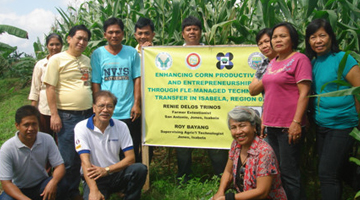 Through the farmer-led extension (FLE) project, Isabela corn farmers become technology transfer agents, while increasing their farm productivity.
Through the farmer-led extension (FLE) project, Isabela corn farmers become technology transfer agents, while increasing their farm productivity.
Aside from proving the value of S&T-based production, the project also provided Isabela State University (ISU) agriculture student interns to work closely with farmer-leaders in learning science and technology (S&T)-based production and marketing of corn in FLE-managed farms.
Farmer-Led Extension harnesses the expertise and capabilities of farmer-leaders. Farmer-leaders are trained especially on the establishment of FLE-managed technology demonstration. These farmer-leaders in turn demonstrate and teach their techniques to other farmers.
Banking on this, PCARRD and the Department of Agriculture Regional Field Unit (DA RFU) 2 jointly funded “Enhancing corn productivity through FLE-managed technology transfer in Isabela Region 2”.
Other accomplishments
Since the project’s implementation in October 2010, 107 farmer-leaders and agricultural extension workers, including 15 selected graduating students from the different ISU campuses, have been trained on corn production technologies.
Also, the project established FLE-managed technology demonstration areas. Sixty-one Bio-N technology demonstrations were set up for the cropping season while 28,548 packets of Bio-N fertilizers have been distributed.
To manage corn borer, FLE farmers were provided approximately 30,900 Trichograma cards to cover 479 hectares (ha) of corn farms, while 57 colonies of earwigs were produced and distributed to 17 farmers with 25.5 ha corn farms.
In a field visit of PCARRD technical staff members, Dr. Arturo S. Argañosa and this writer, both observed the growth in size of the corn plants in the farms of Mr. Rene delos Trillos, one of the farmer-cooperators in San Antonio, Jones, Isabela.
Based from the agronomic performance of corn plants with S&T interventions, especially on the use of Pioneer 30T80 variety, Trillos expects a harvest of more than 10 tons per hectare.
